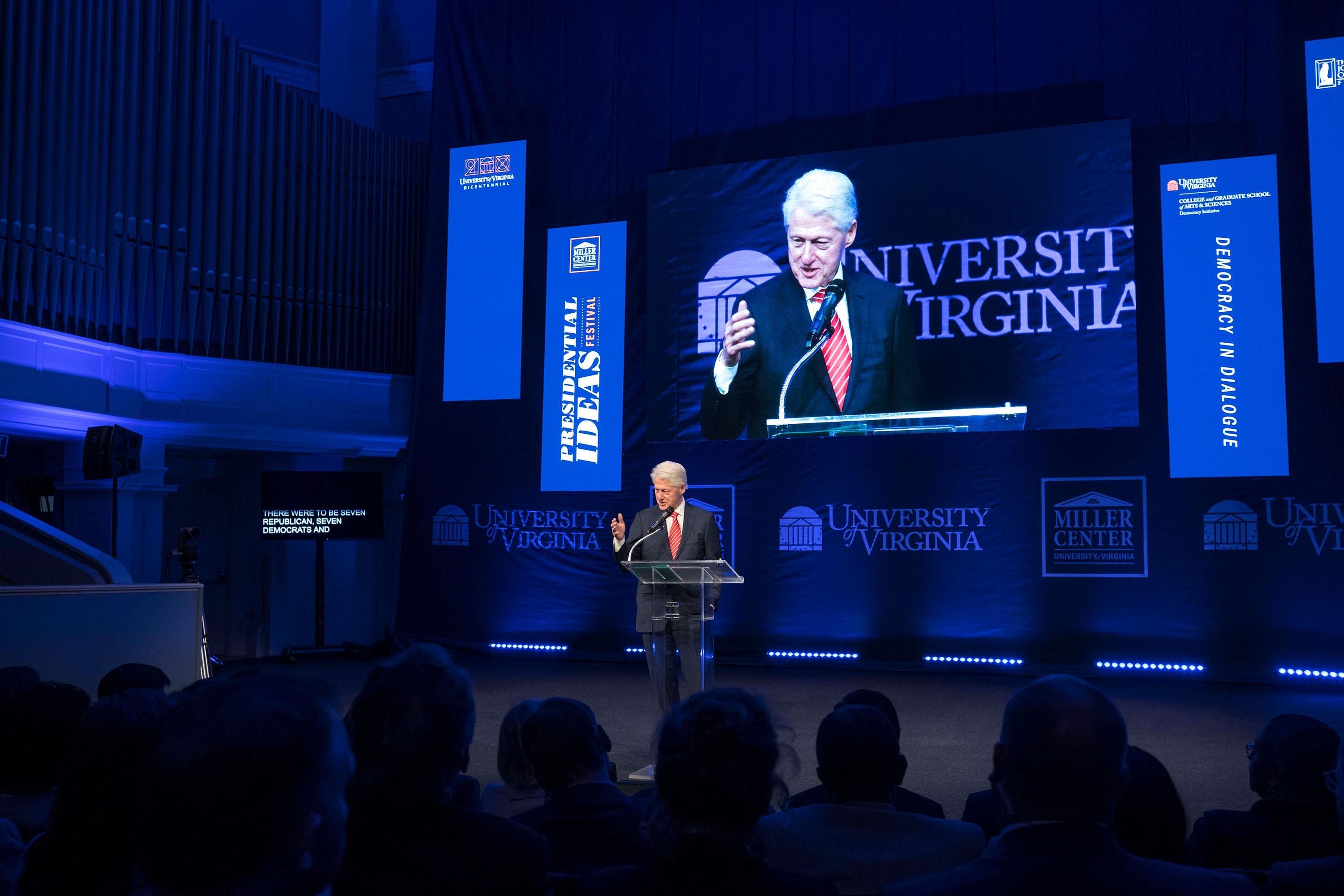Just more than 200 years ago, three U.S. presidents gathered to lay the cornerstone for the University of Virginia, a place they hoped would educate the future leaders of their fledgling democracy.
This week, hundreds of scholars, policymakers, historians – and even a former president – gathered just yards from that spot to discuss the state of that very democracy and the future of the American presidency that upholds it.
The Presidential Ideas Festival, hosted by UVA’s Miller Center and the University’s Democracy Initiative, spanned three days and included nearly 100 speakers, with former President Bill Clinton joining scores of influential policymakers, White House veterans and UVA faculty members. They were gathered in the spirit of what UVA President Jim Ryan, addressing a packed Old Cabell Hall on Tuesday, called “the original, animating purpose of UVA – to serve, and in particular, to serve democracy.”
“I believe universities have a unique responsibility to do our part to strengthen and sustain democracy, and while this is true for all universities, it is especially true for this university,” he said, noting that UVA founder Thomas Jefferson also articulated America’s founding ideals.
“We have been striving to bring us closer to those ideals by pointing out, based on facts, where we are falling short, and by preparing a new generation of leaders who will bring us closer to realizing those ideals,” Ryan said.
Topics ranged from America’s role in international affairs – featuring a former secretary of state and a top foreign policy advisor – to the role of the press and digital media – featuring two former directors of communications in the Clinton and George W. Bush White Houses. Former speechwriters from both sides of the aisle discussed presidential speechmaking with attendees over lunch; and UVA Center for Politics Director Larry Sabato joined commentators from the New York Times, MSNBC and more to break down the 2020 election.
In short, a lot happened, and all of it was focused on analyzing, exploring and celebrating one of the most important institutions in American democracy, both now and 200 years ago. Follow the links to hear what just a few of those on hand had to say about it.
Bill Clinton Takes Capacity Crowd on a Walk Through History
UVA’s Larry Sabato Hosts Panel Breaking Down the 2020 Election
Bill Clinton Takes Capacity Crowd on a Walk Through History
Clinton returned to the University on Thursday to address a large crowd at Old Cabell Hall at the conclusion of the three-day Presidential Ideas Festival.
At the beginning of his talk, the 42nd president recalled his earlier visit to Grounds, when then-President George H. W. Bush hosted a two-day national education summit at UVA in 1989. Clinton led the delegation of governors and, after his Republican counterpart had to leave, had to present both Republican and Democratic viewpoints.
He called it “one of the most rewarding weekends in my life of public service.” Looking back now, he said, he also marveled at the bipartisanship that allowed a Republican to trust a Democrat to faithfully represent the views of the party.
“Now – can you imagine that?” Clinton asked.
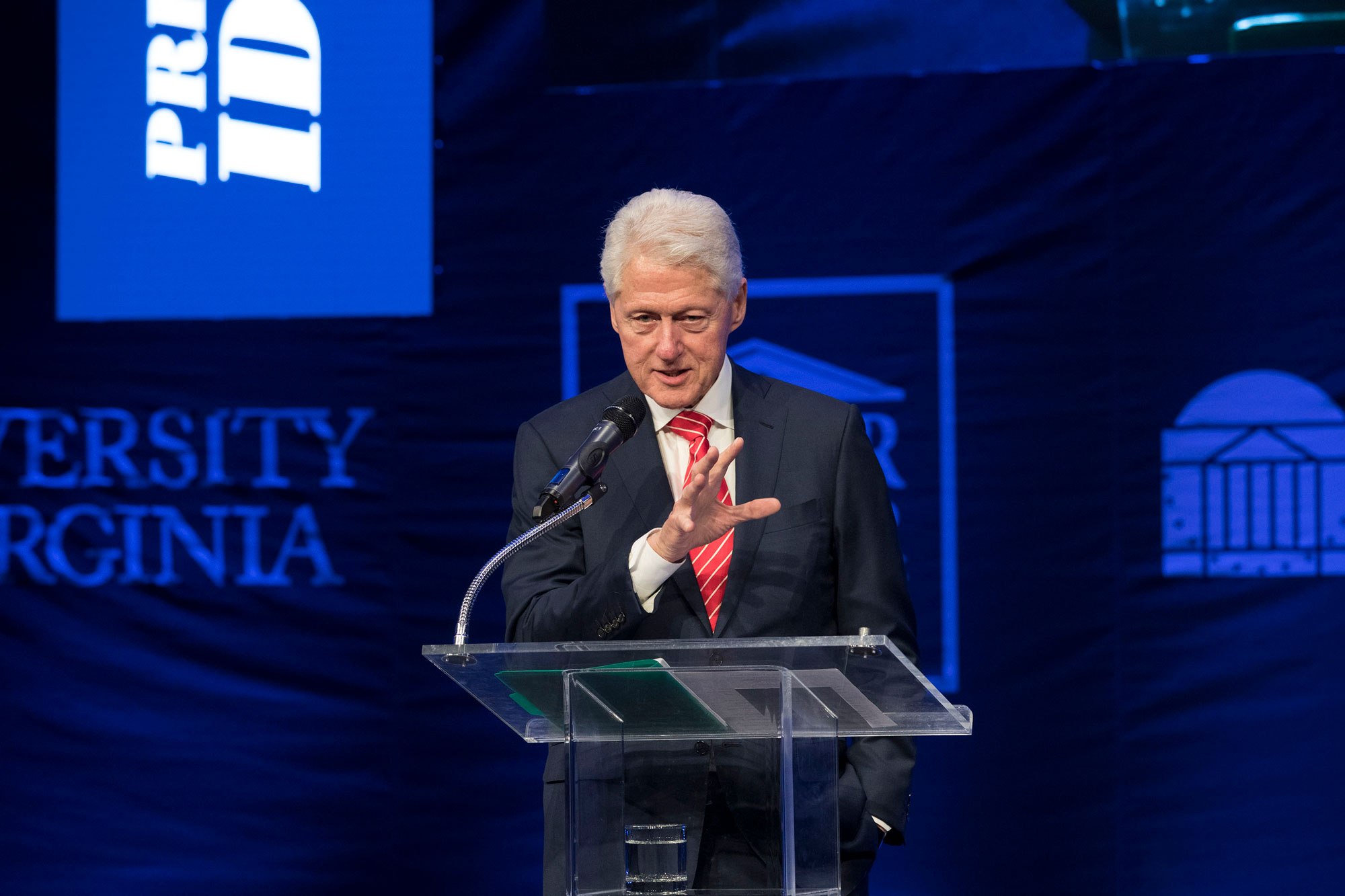
Former President Bill Clinton reflected on his time in the Oval Office and the larger arc of the American presidency. (Photo by Dan Addison, University Communications)
Today’s political divisions, he said, make it even more important to continually evaluate and consider the presidency – past, present and future – as the Presidential Ideas Festival strove to do. For Clinton, the office’s essential mission lies in the preamble of the Constitution – ‘We the People of the United States, in Order to form a more perfect Union …”
“That becomes the responsibility of the president, to work for ‘We the People’ forming a more perfect union,” Clinton said. “Every single president, from George Washington to Donald Trump, consciously or not, has had to define what ‘a more perfect Union’ means, and in order to do that, must first decide who constitutes ‘We the People.’
“Is it the people who voted for and supported you?” Clinton asked. “Is it all the people who are eligible to vote, but otherwise can’t do anything for you? Is it the people who look like you, pray like you, love like you, speak the same mother tongue as you? Do you really believe that the Declaration of Independence is right, that we are all created equal and entitled to the same rights and freedoms?”
He asked the audience to join him on “a quick walk through history” to see how different presidents have answered that question.
Clinton moved rapidly through the arc of American presidents, from George Washington – whom he credited with giving life to the Constitution’s ideas – to Thomas Jefferson’s physical expansion of U.S. borders, all the way through the Civil War, the Industrial Revolution, the progressive movement and more modern politics.
With each expansion of “We the People,” each movement made the union more equal or open, Clinton argued. “Then came the reaction,” he said, spurring political division.
“We have not had anything but increasing intensity of partisan discourse, by and large, since the ’80s,” he said. But there were also instances of hope.
“Even in the toughest of times, there were always manifestations of expanding our perfect union,” he said, citing examples of presidents from both parties working to expand legal immigration, protect the environment and work together across the aisle.
Such instances, Clinton said, are the continued responsibility of both elected officials and citizens.
“It’s an old document, the Constitution. It’s an old office, the presidency. But it is still new every day,” he said.
Clinton expressed a firm belief that the founding ideals of the Constitution would continue to endure, but also offered a warning.
“It is my experience that it is almost impossible to extinguish the urge to make the union more perfect, but there are forces who would by making sure that it becomes more ideological, more racially homogenous, less engaged with the rest of the world,” Clinton said.
“We need the president to speak for a bigger ‘We the People,’ not a smaller one,” he concluded, drawing a huge round of applause.
As a final example, he offered an anecdote from his own White House term, when NASA, in commemoration of the anniversary of the moon landing, presented him with a roughly 3.6 billion-year-old moon rock.
Clinton borrowed the rock to share with Congressional leaders the next day in a contentious meeting. He set the rock between them in the Oval Office, told them to look at it and remember that it was 3.6 billion years old, far older than any of them and any of their dilemmas.
“Now we are all just passing through,” he said. “What do you say we settle down and get something done?”
Life is short, Clinton said, “but that does not make the life of any public servant less significant.” It makes the trappings, the pageantry, the politics, less significant, but the purpose remains.
“We have a responsibility to keep expanding ‘We the People’ and keep making our union more perfect,” he said. “If we do our part, chances are we will get a president and he, and I hope to God someday she, [is] someone who will do the same.”
Former Secretary of State Madeleine Albright and National Security Advisor Stephen Hadley Discuss Foreign Policy
A Tuesday morning panel, moderated by Dickerson, featured former Secretary of State Madeleine Albright, who served in both President Bill Clinton and Jimmy Carter’s administrations, and Stephen Hadley, principal foreign policy advisor to President George W. Bush. Albright’s unapologetic wit, matched with Hadley’s level-headed responses, made for a lively, in-depth conversation. Their friendship and respect for one another created a civil and electric atmosphere in Old Cabell Hall to kick off the Presidential Ideas Festival.
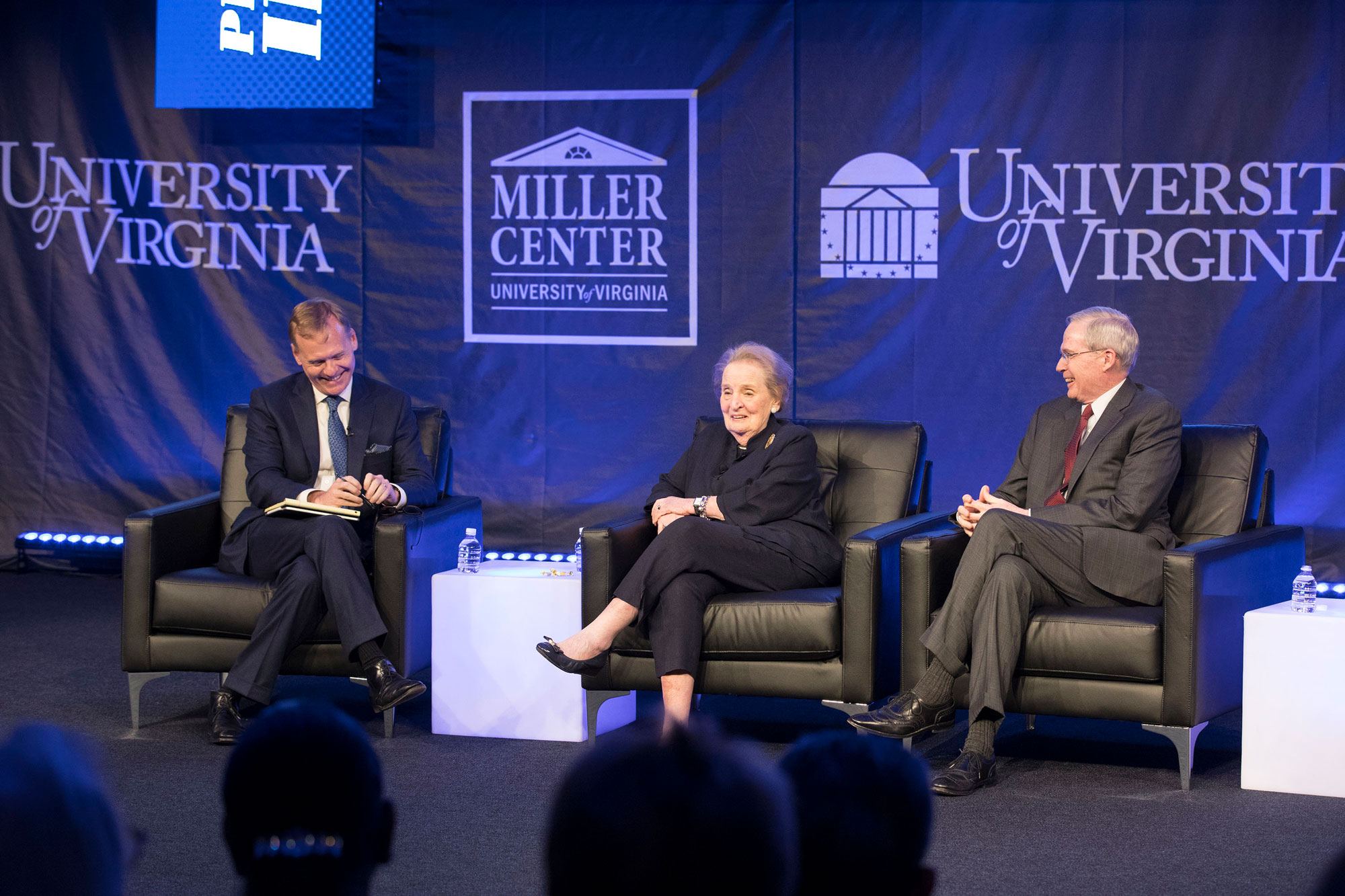
Former Secretary of State Madeleine Albright, center, and foreign policy adviser Stephen Hadley, right, kicked off the festival with moderator John Dickerson. (Photo by Dan Addison, University Communications)
The discussion ranged from their opinions on actions of the current administration to the U.S.’s past and present relationship with China, North Korea and Iran. However, they continually circled back to the importance of the presidential decision-making process, which both have witnessed firsthand.
Hadley painted a picture of a productive discussion in the Oval Office for the audience. In a best-case scenario, he said, the president should be given all the pertinent information and options as well as advice from multiple perspectives. The most important part of the process, Hadley remarked, is when the president steps away from the situation to think about his decision, frequently announced the following morning.
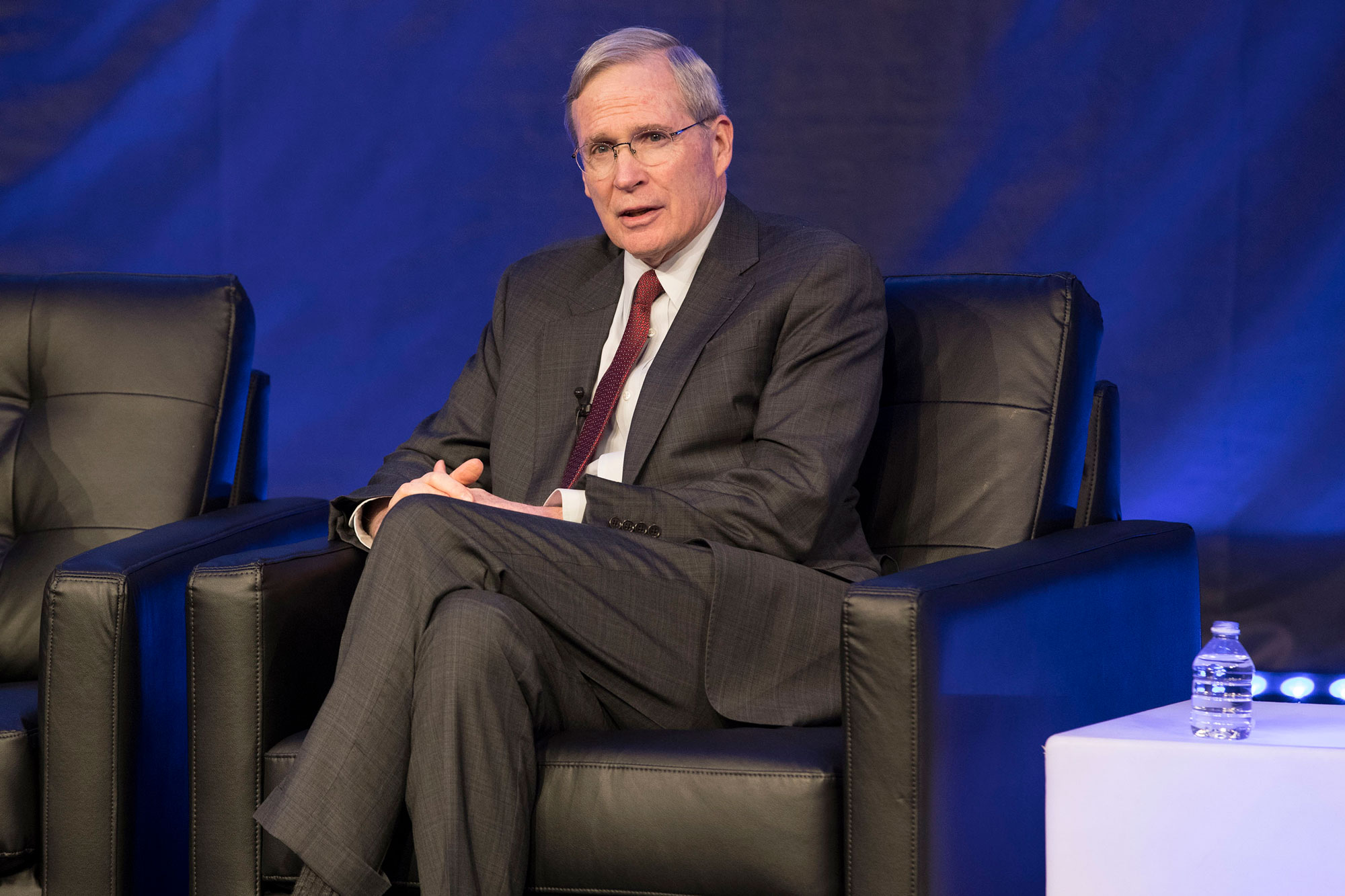
Stephen Hadley gave the audience a behind-the-scenes look at how a president makes foreign policy decisions. (Photo by Dan Addison, University Communications)
“That is what matters at the end of the day,” Hadley said. “What are a president’s values? What does he care about? [...] What is his vision for America and the world, and how can he communicate that?”
Albright, a professor of diplomacy at Georgetown University, believes the president must have a strong understanding of the history of the U.S. to make informed decisions for the future and must set up a consistent decision-making process.
“The U.S. government makes thousands of decisions every day… and the hardest ones are made by the president,” she said. “Therefore, he is entitled to a decision-making process that gives options that are well-explained, based on good intelligence… it is something that requires a systematic approach.”
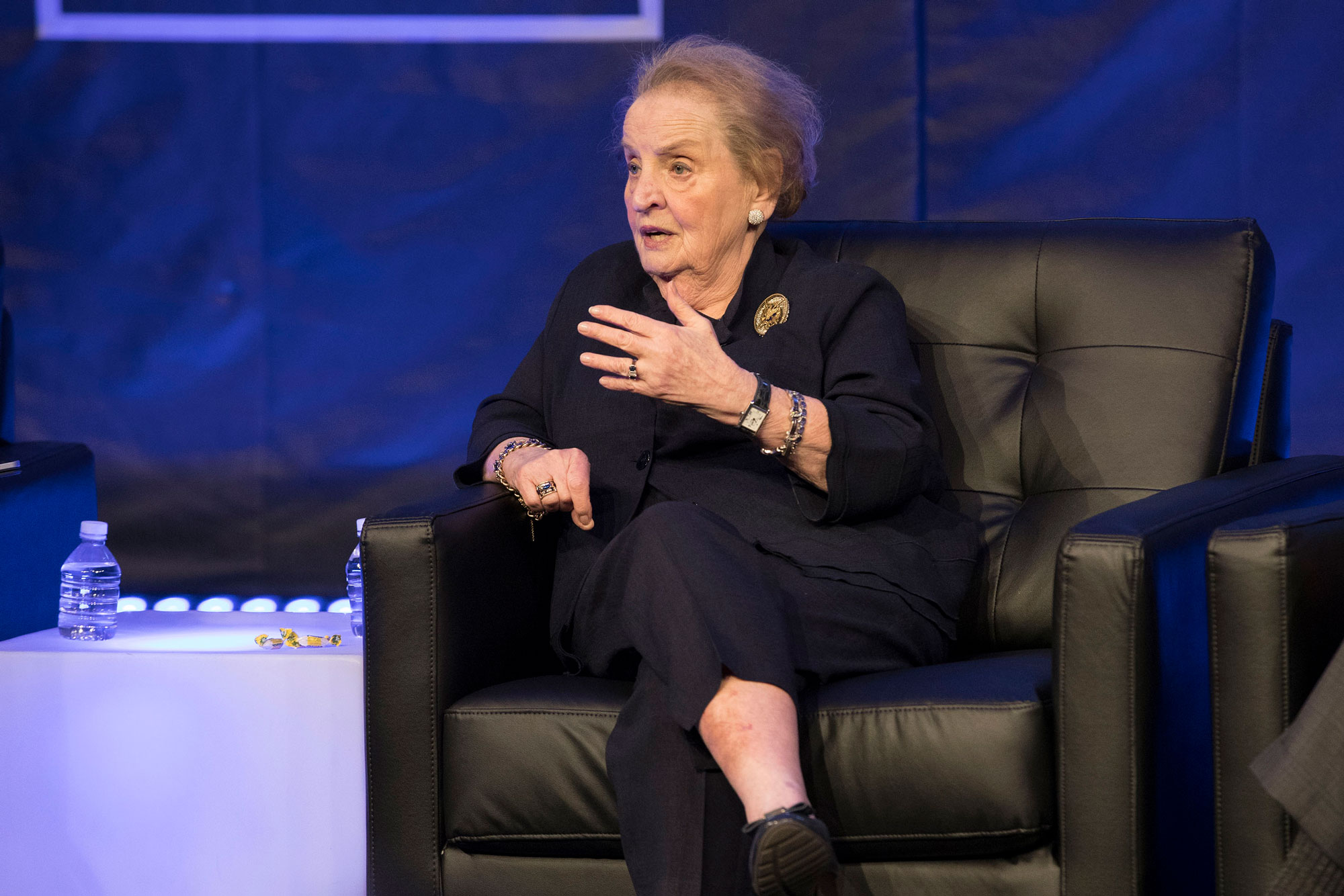
Madeleine Albright said America’s relationship with China should be a top concern for any president or presidential candidate. (Photo by Dan Addison, University Communications)
Both emphasized the importance of America’s relationship with China. Hadley said the two are “strategic competitors” but also asked, “can we be strategic cooperators?” Albright mentioned the rise of nationalism in China and the country’s leadership on climate change. “There is no reason, and it is wrong, to isolate [the Chinese],” she and Hadley agreed.
The two White House veterans also gave some insight into the upcoming presidential election. They both seemed to agree on the most important question for the 2020 candidates: What is your vision for America’s role in the world?
“The foundation for any successful foreign policy is an effective, functioning state at home and we don’t have that right now,” Hadley said, citing gridlock in Washington. “The big questions turn on the candidates’ vision for America, the problems they see for the country and their ideas for dealing with those.”
Albright ended the session with a nice anecdote about her favorite privilege as Secretary of State: awarding naturalization certificates. She awarded one on July 4, 2000 at Monticello and recalled overhearing the man remark in shock, “I just got my naturalization certificate from the secretary of state and I’m a refugee.” Born in Czechoslovakia, Albright, also a naturalized citizen, responded, “can you believe a refugee is secretary of state? That is what America is about.”
At that, the audience broke into a warm round of applause.
UVA’s Larry Sabato Hosts Panel Breaking Down the 2020 Election
At this point, the Democratic presidential nomination is Joe Biden’s to lose, according to panelists at the Presidential Ideas Festival.
Sabato, director of UVA’s Center for Politics and its Crystal Ball election forecasting website, hosted a panel Wednesday with Amy Walter, national editor of The Cook Political Report, New York Times opinion columnist Jamelle Bouie, MSNBC host Chris Matthews and Karl Rove, a senior advisor to former President George W. Bush.
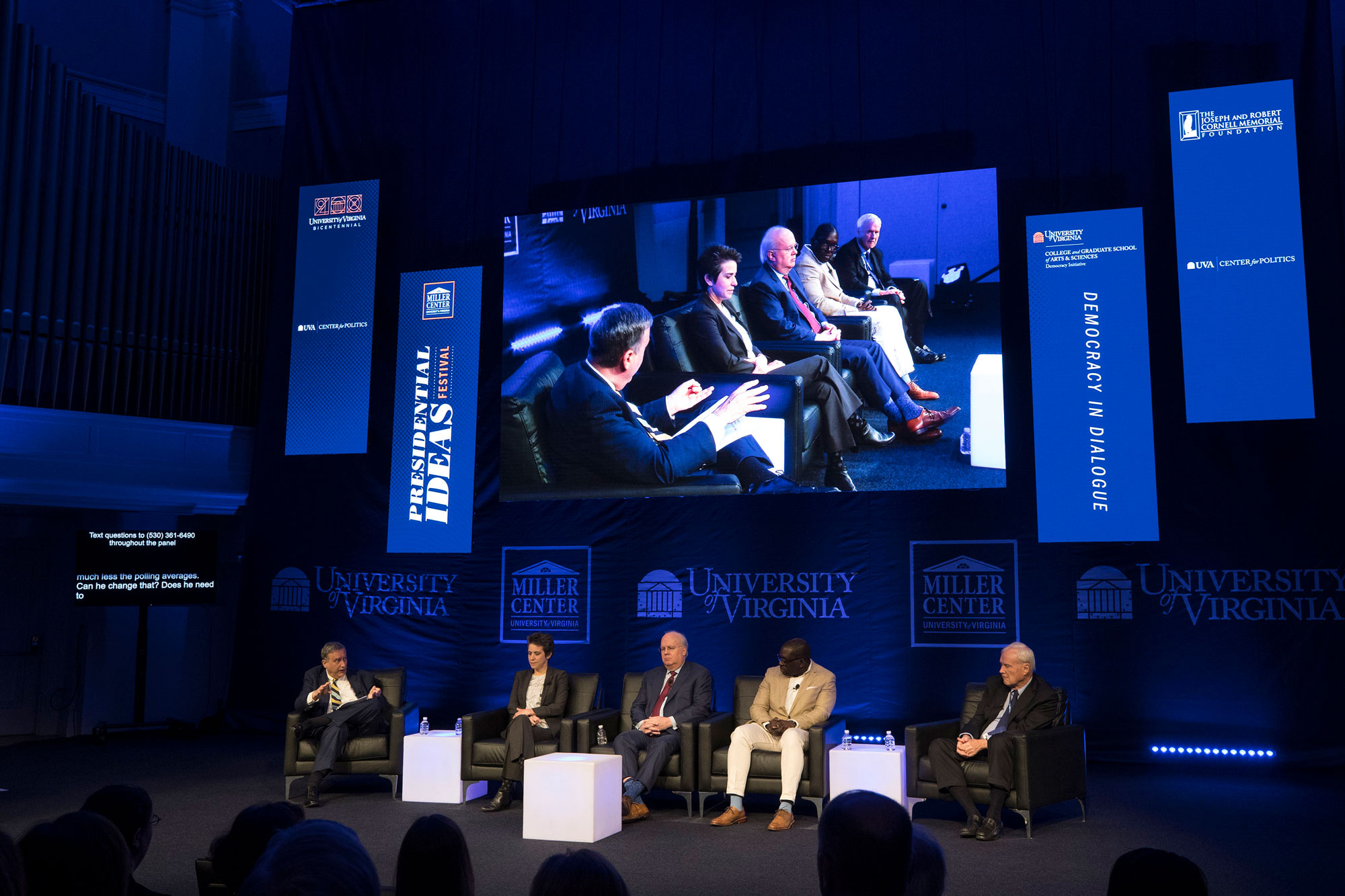
UVA Center for Politics Director Larry Sabato, left, with panelists Amy Walter, Karl Rove, Jamelle Bouie and Chris Matthews, left to right. (Photo by Dan Addison, University Communications)
Among the bustling audience members were Doug and Barbara Hurd, attending their second day at PrezFest. Big fans of the Miller Center, they enjoyed Tuesday’s speakers on social mobility, as well as the first panel with Madeleine Albright and Stephen Hadley. Barbara Hurd expressed excitement about the many lunch session topics on Wednesday, such as “Social Media and Political Warfare” and “Religion and Democracy.”
She remarked, “I’m having a hard time picking which one to go to.”
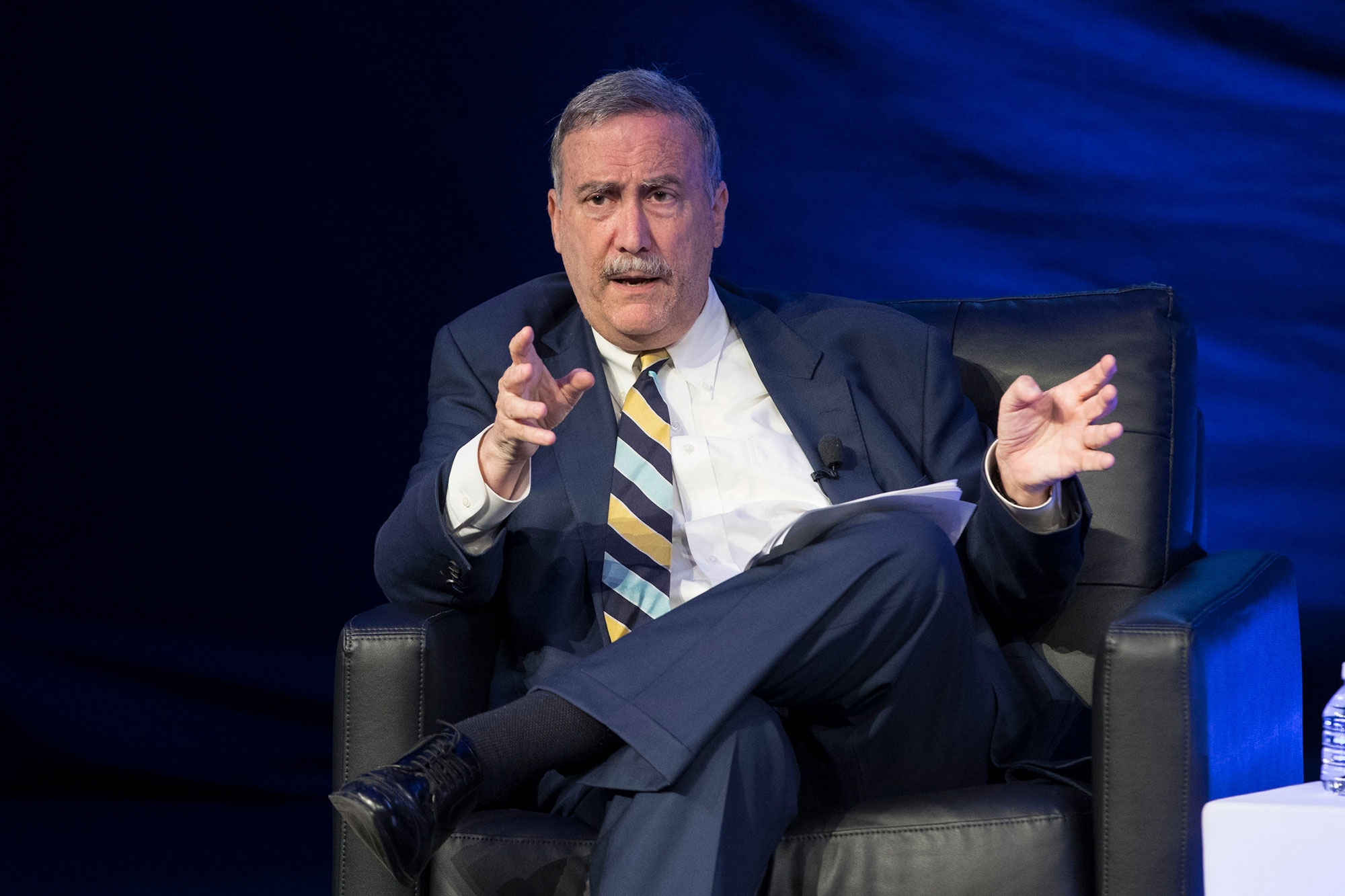
Larry Sabato’s Crystal Ball website was declared among the most accurate in the nation by independent statistician Nicholas Cohen last year. (Photo by Dan Addison, University Communications)
For now, the Hurds and others in the audience were focused on 2020. Former vice president Biden, the panelists agreed, is the frontrunner in a large field – 24 candidates at this point – vying to challenge President Donald Trump.
Bouie, a UVA alumnus, noted that Biden is drawing voters from almost every corner of the Democratic party, from the moderates, who agree with many of his views, to the very liberal, who see him as their best option for defeating Trump. He cited elections like Sen. Doug Jones in Alabama or Virginia Governor Ralph Northam as examples of Democrats uniting a broad coalition of moderate and liberal voters.
“Biden is popular with much of the party, and sweeping up all kinds of constituents,” Bouie said. “It will depend on how he performs over the year.”
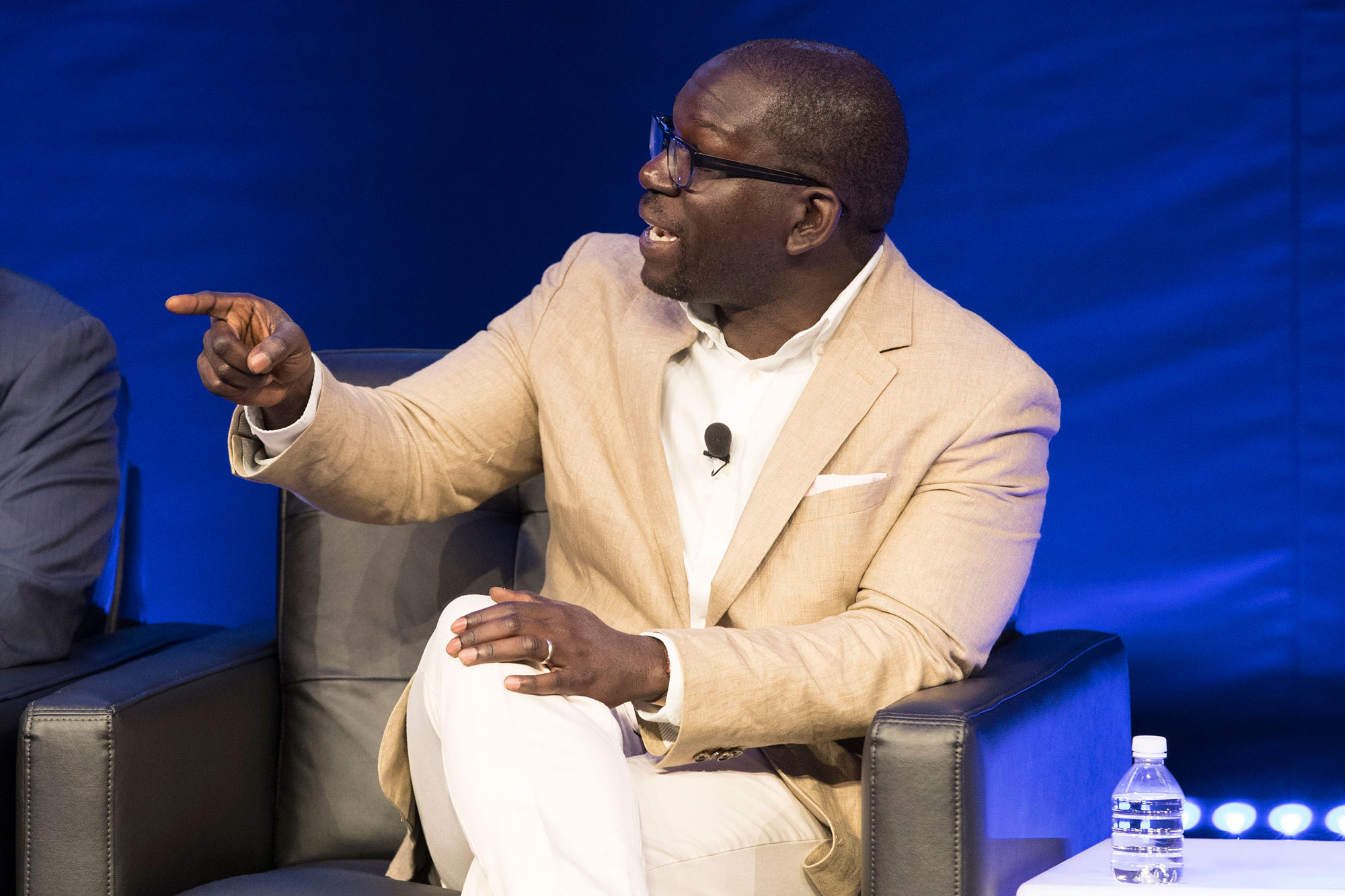
Journalist and UVA alumnus Jamelle Bouie broke down Democratic candidates’ possible strategies and chances at the nomination. (Photo by Dan Addison, University Communications)
“If he sees a sudden collapse, all of those votes will be up for grabs” for candidates like Kamala Harris or Elizabeth Warren, Bouie said.
Rove, known as “The Architect” of Bush’s successful 2000 and 2004 presidential campaigns, said the 2020 campaign could be unusually dependent on individual candidates, rather than overall parties.
“This campaign, more than any I have seen in my lifetime, is going to depend on the individual performance of the campaigns over a sustained amount of time,” he said. “Right now, Biden is the most likely nominee, but he is in a position of vulnerability.”
Trump, the panelists agreed, will have to go on the attack as he battles low approval ratings, hovering around or below 40 percent. Matthews predicted the president would focus on three key issues that could damage his Democratic opponent in voters’ eyes, particularly if that opponent is farther to the left than Biden.
“I think he is already trumpeting the ‘big three,’” the “Hardball” anchor said. “Open borders. Late-term abortion. Socialism… that is the trifecta.”
Regardless of the eventual Democratic nominee, Sabato said he expects high voter turnout in the general election. However, as Bouie noted, voter registration and restrictions could affect the race.
“Not every member of the public has equal access to the polls,” Bouie said. “Who actually gets to the ballot will matter just as much as what people want to happen.”
“It is incumbent on all of us to make sure that everyone who wants to vote, gets to vote, who is qualified,” Sabato said.
If that happens, and if candidates continue to energize their base, we could see “the highest turnout in modern American history,” he said.
How Is Democracy Doing? Melody Barnes, Risa Goluboff and White House Alumni Assess Democracy Around the Globe
“A republic, if you can keep it.”
Melody Barnes, co-director of UVA’s Democracy Initiative, concluded her Wednesday morning panel discussion with that quote from Benjamin Franklin, reminding Americans past and present that democracy is only as strong as those who work to uphold it.
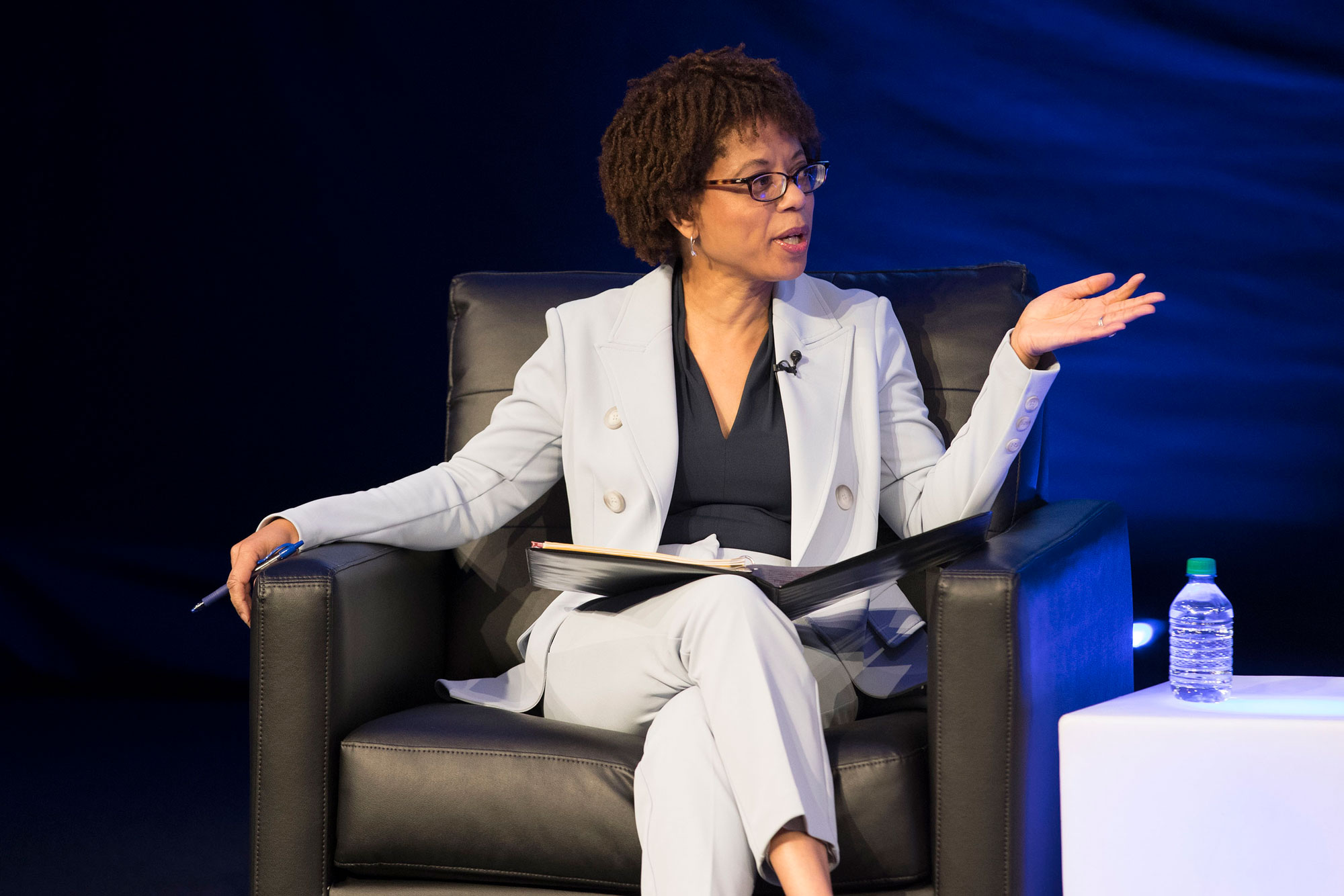
Melody Barnes, co-director of UVA's Democracy Initiative, moderated a Thursday panel on the state of democracy worldwide. (Photo by Dan Addison, University Communications)
Barnes, who directed the White House Domestic Policy Council under President Barack Obama, moderated a panel discussion, “Why Democracy?” with Risa Goluboff, dean of UVA’s School of Law; Susan Rice, former national security advisor to Obama; and Peter Wehner, former director of the White House Office of Strategic Initiatives under President George W. Bush. She knew them all well, having taught as a professor of practice at the School of Law with Goluboff, invited Wehner to speak with her class and worked with Rice at the White House.
The discussion began at the fundamental level of the Constitution, as Goluboff, a constitutional law scholar, explained how the document continues to shape representative democracy today.
“The Constitution itself creates not only a structure for governance, but all the vocabulary with which we debate and argue,” she said. “[It] creates aspirations about who we want to be, which we sometimes achieve and sometimes do not.”
Rice offered an assessment of the state of democracy around the world, which, she said, “is, to be charitable, anemic.” New democracies grew quickly in the 1990s, but much of that momentum has been lost, she said.
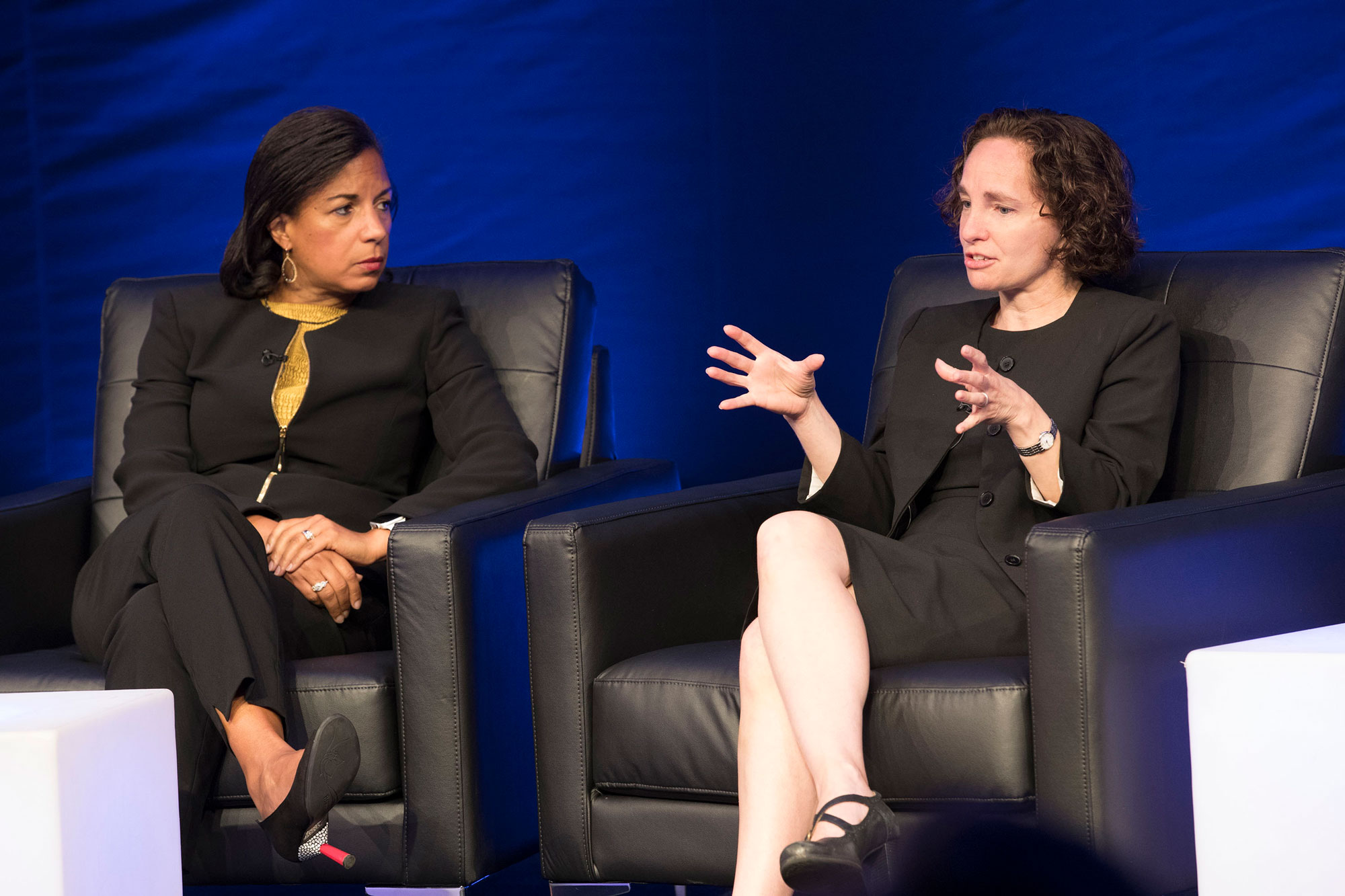
Susan Rice, left, drew on firsthand experience in the White House while School of Law Dean Risa Goluboff offered perspective from her expertise in constitutional law. (Photo by Dan Addison, University Communications)
“Now we see a stagnation in terms of the actual number of democracies, but more worryingly, in the character and caliber of democracy where it exists,” she said, citing the election of authoritarian leaders in countries like Hungary and Turkey as well as controversy and polarization in the United States.
“Having been the world’s most prominent democracy, we are now exhibiting to the rest of the world the weakness and the failures of democracy, and the ability of our system to yield to tendencies that are authoritarian,” she said. “Our best ability to spread democracy and see it thrive is through us in the U.S. setting a powerful example and encouraging others to do the same.”
Wehmer and others listed a number of threats to democracy worldwide, including “assaults on the truth,” partisanship and political tribalism, alienation, gaps in civic education and polarized echo chambers in traditional and social media.
“You view the people who disagree with you as enemies of the state, and create your own silo where all that you hear are facts and analysis that confirm what you already believe,” he said, speaking generally. “We really have to try, and I am speaking to myself as well, to listen and respond to the people we disagree with.”
Despite these concerns, all four panelists expressed faith in the future of democracy. Wehmer noted that concern and worry are far better than apathy, and Rice said that she expects authoritarian governments to face similar or greater stresses.
“This is a worrying moment, but over the long term I am an optimist for a very simple reason,” she said to applause. “The values that we are talking about are fundamentally universal. […] That fundamental human yearning to be ourselves, be able to express ourselves and live in some fundamental freedom, I believe will win out over time.”
To get there, Barnes said, individuals – from governmental leaders to everyday citizens – must work to create “bridging ties” – “those who are different from each other in various ways still coming together and working across that cleavage to find common cause for the good of civic health, the good of the country.
“Ultimately, those bridging ties could start to become bonding ties, and ways that we can reconnect with one another.”
Media Contact
Article Information
May 23, 2019
/content/bill-clinton-white-house-alumni-headline-uvas-presidential-ideas-festival

